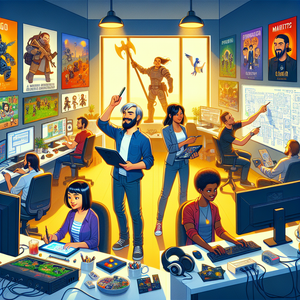
Exploring Exciting Careers in the Gaming Industry: Opportunities, Requirements, and Insights
The gaming industry has evolved into a vibrant and expansive realm, offering a plethora of career opportunities across various domains. With a market worth more than that of the film industry, the scope of careers in gaming extends far beyond traditional development roles. It encompasses production, marketing, community engagement, and much more. Recent studies highlight a burgeoning demand for skilled professionals in areas such as game design, programming, and marketing management. As the industry continues to innovate, candidates must become adept at navigating the specific requirements and nuances of each role. While technical positions like developers often take center stage, other roles, including community managers and marketing executives, are equally essential for a game's success. This dynamic sector presents numerous entry points for both newcomers and seasoned professionals, making it an appealing career choice for gaming enthusiasts.
Job Summaries:
Game Designer:
- Game designers craft the core elements of gameplay, including mechanics and narratives.
- They develop engaging storylines and character arcs that resonate with players.
Game Producer:
- Producers oversee the entire development lifecycle
- Coordinating efforts among designers, artists, and programmers
- Keeping projects on schedule
- Keeping projects within budget
Community Manager:
- Serving as a bridge between developers and players.
- Community managers engage with the gaming community via social media and forums.
- Gathering feedback and fostering a positive environment.
Esports Producer:
- Esports producers design and execute competitive gaming events
- Managing everything from logistics to broadcasting.
Game Tester:
- Testers evaluate video games for bugs and usability
- Documenting their findings
- Collaborating with developers
Marketing Executive:
- These professionals develop marketing strategies to promote games.
- They oversee advertising campaigns.
- They conduct market research.
Technical Artist:
- Technical artists optimize art assets for game engines.
- They address technical challenges related to art creation.
Narrative Designer:
- Narrative designers create rich storylines and dialogues
- Focusing on character development
- Focusing on plot progression
Sound Designer:
- Sound designers develop the audio elements of games
- Including sound effects
- Including music scores
Game Programmer:
- Programmers write the code that brings games to life
- Implementing gameplay mechanics
- Ensuring smooth functionality
Quality Assurance (QA) Specialist:
- QA specialists test games to identify bugs
- Ensure quality standards are met before release.
Game Artist:
- Game artists create visual elements.
- They create characters and environments.
- They use tools like Photoshop.
- They use 3D modeling software.
Business Development Manager:
- These managers identify growth opportunities within the gaming sector
- Analyzing market trends
- Establishing partnerships
Localization Manager:
- Localization managers adapt games for diverse markets
- Ensuring cultural relevance and accuracy in translations.
Game Marketing Analyst:
- Analysts evaluate market trends
- Analysts evaluate player demographics
- Inform marketing strategies
- Optimize campaigns
Game Monetization Specialist:
- These specialists develop strategies to maximize revenue through in-game purchases and subscriptions.
UI/UX Designer:
- UI/UX designers focus on creating intuitive user interfaces.
- Enhancing overall gaming experiences.
Game Development Instructor:
- Instructors teach aspiring developers
- Creating curricula
- Mentoring students through practical projects
Game Researcher:
- Researchers analyze player behavior to guide development and marketing strategies.
Game Data Analyst:
- Data analysts examine gameplay data to derive insights that enhance player engagement.
- Inform design.
These diverse roles highlight the vast opportunities within the gaming industry, catering to a wide array of interests and skill sets. As the sector continues to expand, professionals can look forward to various career paths, competitive salaries, and significant growth potential. For those excited to explore current job openings in these fields, numerous resources are available to uncover thrilling career prospects in the gaming world. Pursuing a career in gaming not only aligns with personal passions but also offers a chance to contribute to an innovative and ever-evolving industry.
Explore More JobsRecommended Articles
Exploring 20 Exciting Careers in the Gaming Industry: A Guide to Opportunities, Responsibilities, and Requirements
Exploring 20 Exciting Careers in the Gaming Industry: Roles, Responsibilities, and Opportunities
Exploring Career Paths in Health and Wellness: Your Guide to Opportunities and Requirements